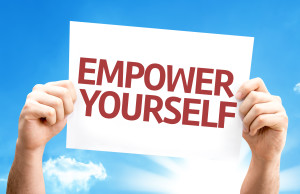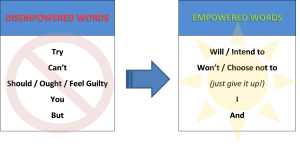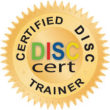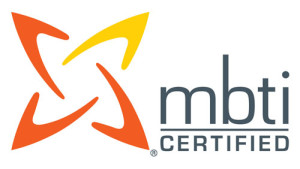 No matter what is going on around us, outside of us, the one thing we can always take responsibility for is how we show up while whatever-it-is is going on. A foundational element of responsibility is ownership, where we claim accountability for our thoughts, feelings and actions—in all circumstances.
No matter what is going on around us, outside of us, the one thing we can always take responsibility for is how we show up while whatever-it-is is going on. A foundational element of responsibility is ownership, where we claim accountability for our thoughts, feelings and actions—in all circumstances.
Think about it: our empowerment does not reside ‘out there,’ in someone else, or ‘eventually,’ when this or that situation is finally going the way we want it to, or when someone extends their approval. Our empowerment resides within us, no matter what, all the time. We simply need to build the muscle of claiming it.
A great place to lean into this concept is with language. The words we use are an outward expression of personal ownership, built on an inner commitment to claim responsibility for our experience. With the outward practice of modifying spoken language, we are also retraining the way we think, so we get a double benefit that pays massive dividends.
Let’s dimensionalize this a bit: Below is a list of popular yet disempowered words, paired with the suggested empowered alternatives, followed by a more in depth discussion of each word and practices that can help shift in the direction of empowered language.
We leak our leadership all over the place using what I’ll call unconscious language that keeps us small, living within an arm’s reach of personal responsibility. Consider working with yourself and your team members to upgrade to empowered language, and watch self-confidence & self-belief grow. Note: be patient with yourself and others – language is a habit, and it can take a measure of persistence to update an established habit.
Try – how much energy would you reclaim if you stopped trying, efforting, striving… and simply committed to doing the thing? Every time we qualify our action with “try” we are giving ourselves a subtle excuse to not get it done, we get an ‘out’. Practice: Be present enough with yourself and your capacity in the moment to commit, one way or the other. Lay down “I’ll try” and use the words “I will” or “I intend to”; or enter negotiation around what you can do, if the thing that has been requested falls outside of your current possibility set. Can you feel the difference?
Can’t – feel into the empowerment of claiming “I choose not to do that” rather than stating “I can’t”. What do you notice? “Can’t” is a passive word that rides on the energy of disempowerment. Much of the time when we use “can’t” we really mean “won’t”. Practice: Say what you mean using empowered language: “thanks for the invitation, this time I’ll pass”; or, “right now I’m choosing no and I hope we have a chance to revisit the opportunity later when I have a clearing in my priorities”; or, “I’m not able (interested / in alignment with… etc.) to give that my full attention right now.” Each one of these, or something like them, carries a vibe of strength and presence that “can’t” simply does not bear.
Should / Ought / Feel Guilty – we leak our leadership, ‘should’ing all over ourselves. “Should” is the realm of the self-critic, and it keeps us a comfortable distance from feeling good about the choices we do make. When we feel guilty about the choices we have made, it’s like one foot is in the door of the choice we said yes to, and the other foot is in the door of the one(s) we did not choose. We keep ourselves on the fence, ambivalent, and unclear. When we do that, we erode our empowerment and dishonor the choice we did make. We put a dent, unwittingly, in our own self-belief & withdraw from the trust bank account. Practice: Give yourself permission to own your choices because they are the right ones for you, unapologetically, and REALLY let the rest go. Train yourself to trust you again. Might seem easier said than done, especially if you have a well-established habit, but you can build a new, far more supportive habit with practice and a little grit. How much freer would you feel as a result?
You – we’ve been conditioned into the huge misunderstanding that our OK-ness and our upset is directly related to some external force. We give a lot of power to “you”, someone other than ourselves, “out there.” Sometimes we also feel like we can soften the impact of the message if we depersonalize with a third-person reference “when you” this-or-that, rather than claiming the point of view we are sharing as our own “when I…”. Personal responsibility begins with owning what it is that you have to say, and making it about yourself when that is your intention. Practice: If you are speaking about the way you feel or think about something, reference yourself as “I” in the conversation. “I” is a key component of ownership language. Drop the “you.” Include yourself in your conversation; take a chance to stand in vulnerability and let yourself be seen.
But — Such an overused word! Do you notice what happens when you qualify a statement with “but”? It discounts the thing you said just before it. Dis-qualifies it. We use this word with reckless abandon, and I encourage you to replace it with the word “and.” Can you feel the possibility in “and” that does not reside in “but”? Get the big “but” out of your way! : ) Practice: enlist the support of someone you trust and ask for them to let you know every time you use the “but” word. Ask them to interrupt you and say “and”, every time you say “but”. They need to speak right over you, so you’ll want to pick someone who cares enough about you to feel uncomfortable while they do this. You’ll find it won’t take long for you to be crystal clear about it’s prominence in your vocabulary, and from there you can launch your own intervention. After you have had some time to work on your own course correction, ask your support person to do another checkin to see how much progress you are making. Repeat the process until you are confident that your new, empowered, but-free habit is established.




